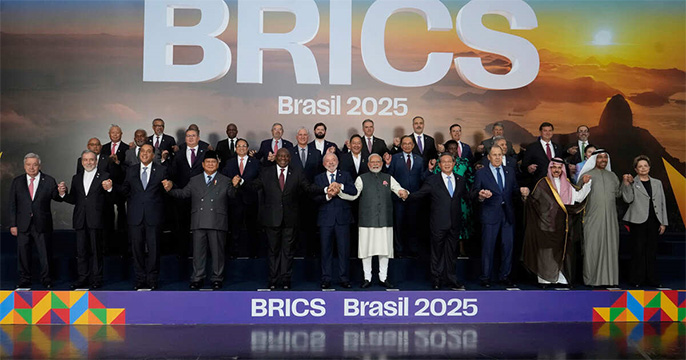 Photo: AP
Photo: AP
The latest BRICS Leaders’ Statement, emerging from the summit in Rio de Janeiro, marks a watershed moment in the bloc’s political evolution – and signals a rebalancing of India’s global posture. For the first time, New Delhi has lent its name to sharp language condemning unilateral sanctions, military strikes in Iran, and the use of starvation in conflict zones – positions that directly confront long-standing US policies, ‘The Statesman’ stresses. As the world tilts toward multi-polarity, India’s calibrated support for these statements is not accidental.
It reflects the shifting terrain of global influence – and a hardening consensus within the Global South. At the heart of the statement lies a principled rejection of coercive economic measures – particularly those imposed without United Nations authorisation. These so-called “secondary sanctions,” once limited in scope, have grown into tools of extraterritorial pressure with serious implications for development and human rights. India, though a partner to the West in many areas, has consistently resisted such onesided diktats.
Its continued purchase of Russian energy, even amid Western sanctions, underscores this position. Equally significant is India’s decision to co-sign the condemnation of the US-Israeli strikes on Iranian nuclear sites – acts labelled as violations of international law. This is a departure from New Delhi’s usual reluctance to name powerful actors in multilateral settings. By not distancing itself from the statement – as it did with a similar Shanghai Cooperation Organisation draft – India is signalling a maturing confidence in its independent worldview.
In an era of transactional geopolitics, this is not about choosing sides, but asserting autonomy. The statement’s concern over Gaza – especially its reference to starvation as a method of warfare – places BRICS on a moral high ground. India’s inclusion in this consensus is notable, given its past hesitation in UN forums calling for ceasefires.
That Prime Minister Narendra Modi addressed the humanitarian crisis directly at the summit signals that India is willing to speak on tough issues, even if it complicates its bilateral equations. A two-state solution may remain the official line, but the evolving nature of conflict demands moral clarity – something the BRICS platform appears ready to embrace. US President Donald Trump’s retaliatory threat to impose additional tariffs on countries “aligning with anti-American policies” reveals how high the stakes have become. Economic coercion, once veiled in policy language, is now openly political. But such pressure tactics may only deepen the resolve of emerging powers.
The BRICS bloc is no longer just an economic grouping – it is becoming a political counterweight. India’s foreign policy has long been guided by strategic autonomy. What is new is the comfort with aligning that autonomy with a collective voice – especially when that voice calls out global imbalances. As the BRICS platform grows in relevance, so too does India’s opportunity to shape its future – not in opposition to the West, but on terms rooted in sovereignty, legality, and a shared vision for a more balanced global order.
read more in our Telegram-channel https://t.me/The_International_Affairs

 11:06 13.07.2025 •
11:06 13.07.2025 •






















